 In the summer of 1867, General John A.
Rawlins, the Chief of Staff of the United
States Army, joined General Grenville M.
Dodge and a party of surveyors. As they rode
west and approached the hills that stand
guard over the present city, General Rawlins
expressed a desire for a good cold drink of
water. Scouts discovered a spring near the
base of the hills. As the Generals sat drinking
from the returned water, General Rawlins
declared it was the most refreshing drink he
had ever tasted. “If anything is ever named
after me, I hope it will be a spring of
water”, he exclaimed. Immediately, General
Dodge named the spring “Rawlins Springs”, and
marked it so on his map, thus the town of
Rawlins Springs was born. Sometime later the
Springs was dropped to create the present day
Rawlins, Wyoming.
In the summer of 1867, General John A.
Rawlins, the Chief of Staff of the United
States Army, joined General Grenville M.
Dodge and a party of surveyors. As they rode
west and approached the hills that stand
guard over the present city, General Rawlins
expressed a desire for a good cold drink of
water. Scouts discovered a spring near the
base of the hills. As the Generals sat drinking
from the returned water, General Rawlins
declared it was the most refreshing drink he
had ever tasted. “If anything is ever named
after me, I hope it will be a spring of
water”, he exclaimed. Immediately, General
Dodge named the spring “Rawlins Springs”, and
marked it so on his map, thus the town of
Rawlins Springs was born. Sometime later the
Springs was dropped to create the present day
Rawlins, Wyoming.
Rawlins remained a raw and rowdy cow-town
for many years. Its location in the western
foothills of the Rockies made it a place to
wait out the winter blows in the upper
mountains. This is precisely what we ended
up doing. An early snow storm blew in and we
needed a place to hunker down until it
passed. The Western Hills Campground high
over I-80 is open all year round. It is
about the only one that is in the area.
Doreen McDade and her husband John, are
wonderfully supportive RV park people who
will do just about anything to make your stay
as pleasant as possible.
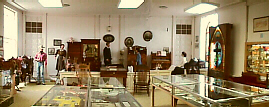 There are several worthwhile points of
interest in Rawlins. The old Territorial
Prison is open for tours. The Ferris Mansion
which is now a B&B is a delightful turn of
the Century Victorian home. However the most
interesting place for us was the Carbon County Museum at 9th and Walnut.
From my previous writings, it is obvious I migrate to
There are several worthwhile points of
interest in Rawlins. The old Territorial
Prison is open for tours. The Ferris Mansion
which is now a B&B is a delightful turn of
the Century Victorian home. However the most
interesting place for us was the Carbon County Museum at 9th and Walnut.
From my previous writings, it is obvious I migrate to
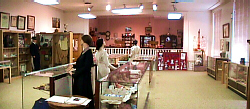 these local treasures where one can find the
history and color usually not covered in any
other place. It is here that some of the best
stories are found, and it was here that I
heard the bazaar story of Big Nose George
Parrott. Now, Big Nose George was a somewhat
inept train robber who operated in the county
in the late 1800.
these local treasures where one can find the
history and color usually not covered in any
other place. It is here that some of the best
stories are found, and it was here that I
heard the bazaar story of Big Nose George
Parrott. Now, Big Nose George was a somewhat
inept train robber who operated in the county
in the late 1800.
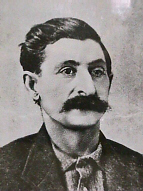 He once commented that his nose was so big there was no reason
to wear a mask, as they would know him anyway. After
bungling a train robbery in 1881 he was
arrested and held in Rawlins. On March 22,
1881, not wishing to remain in jail, he
arranged an escape, but it was foiled when
his nose gave him away while walking down the
street. He was grabbed and a crowd gathered.
He was bound and lead to a telephone pole at
3rd and Front street where he was hung,
twice, as the first attempt failed. A
prominent local physician, Dr. John Osborn
was summoned to pronounce the outlaw dead.
He was then buried. A note by the undertaker
indicated that George’s nose was so large
that the lid of the coffin would not close.
The next day,
He once commented that his nose was so big there was no reason
to wear a mask, as they would know him anyway. After
bungling a train robbery in 1881 he was
arrested and held in Rawlins. On March 22,
1881, not wishing to remain in jail, he
arranged an escape, but it was foiled when
his nose gave him away while walking down the
street. He was grabbed and a crowd gathered.
He was bound and lead to a telephone pole at
3rd and Front street where he was hung,
twice, as the first attempt failed. A
prominent local physician, Dr. John Osborn
was summoned to pronounce the outlaw dead.
He was then buried. A note by the undertaker
indicated that George’s nose was so large
that the lid of the coffin would not close.
The next day,
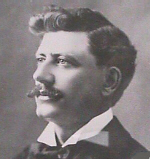 Dr. Osborn, along with Doctors
Thomas Mead, and Lillian Heath exhumed the
body, ostensibly to examine the brain in
hopes of determining if the criminal mind had
an identifiable abnormality. The top of the
skull was cut off and remained in the
possession of Dr. Heath for some time. It is
reported that Dr. Osborn’s involvement
bordered on the morbidly bizarre. He made a
death mask out of plaster of paris and
removed skin from Parrott’s thigh and chest.
The skin was tanned and made into a pair of
shoes that Dr. Osborn sometimes wore to
events and dances.
Dr. Osborn, along with Doctors
Thomas Mead, and Lillian Heath exhumed the
body, ostensibly to examine the brain in
hopes of determining if the criminal mind had
an identifiable abnormality. The top of the
skull was cut off and remained in the
possession of Dr. Heath for some time. It is
reported that Dr. Osborn’s involvement
bordered on the morbidly bizarre. He made a
death mask out of plaster of paris and
removed skin from Parrott’s thigh and chest.
The skin was tanned and made into a pair of
shoes that Dr. Osborn sometimes wore to
events and dances.
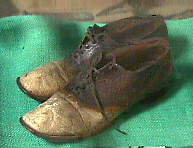 This grotesque act failed
to tarnish the good doctor’s image as he was
elected governor of Wyoming in 1893, and
later became the assistant Secretary of State
under President Wilson. Poor George’s
remains were committed to a salt solution in
a whisky barrel in the rear of the doctor’s
office where it remained for a year. Not
much was known of it after that although in
retrospect it was most probably put in a land
fill near the doctors office where it
remained until 1950 when it reappeared in an
excavation for a new structure where the old
doctor’s office had stood. The barrel was
still intact. The top of the skull was
retrieved from an nearby museum and matched
against the skull in the barrel for a perfect
fit. Not exactly your everyday museum story.
This is why the small county museums can be
so fascinating. You never know what you will
find.
This grotesque act failed
to tarnish the good doctor’s image as he was
elected governor of Wyoming in 1893, and
later became the assistant Secretary of State
under President Wilson. Poor George’s
remains were committed to a salt solution in
a whisky barrel in the rear of the doctor’s
office where it remained for a year. Not
much was known of it after that although in
retrospect it was most probably put in a land
fill near the doctors office where it
remained until 1950 when it reappeared in an
excavation for a new structure where the old
doctor’s office had stood. The barrel was
still intact. The top of the skull was
retrieved from an nearby museum and matched
against the skull in the barrel for a perfect
fit. Not exactly your everyday museum story.
This is why the small county museums can be
so fascinating. You never know what you will
find.
* * * THE END * * *
